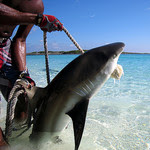Like me, many mothers with sons are likely to have an ‘above
average’ knowledge of dinosaurs and sharks. Some of this knowledge stays with you even as the
boys grow into men – and some of it stays with them no doubt, if not crowded
out by hormones etc.
Aside from the seminal film ‘Jaws’ tainting the Great
White with a human-hating personality, and the dubious invention of ‘Sharktopus’, most of what I
have seen on sharks is documentary. My son was riveted by Discovery Channel’s Shark Week and we had
at least two model sharks (though seriously outmatched by a whole zoo of
plastic dinosaurs).
 |
| Ichthyosaur |
I visit the Cambridge University
museums often – particularly the Sedgwick
which houses prehistoric relics from the region and a full-size replica of an iguanodon
skeleton. I love looking at the model recreations of small dinosaurs, and the skeletal
remains of ichthyosaurs that are a step towards our modern sharks. I say
modern, but sharks in fact pre-date dinosaurs by several million years.
Sharks are apex predators – an
essential part of the complex ecosystems that live in our oceans. Though I’m
relieved that the megalodon
(a prehistoric shark which might have been as long as 67 feet) is extinct, it
is concerning that we are losing our current populations of sharks. At current
rates several species may join the megalodon in extinction very soon.
Why? What is happening to our
sharks, and what is the impact of losing them? This apex predator is itself
being predated. It is being hunted and consumed by an animal with no predator to
manage its population – or its hunger for wildlife: humans. Millions of sharks
are fished for their meat, skin and liver oil, whilst some are taken just for
their fins.
 |
| Shark fishing |
Sharks continue to fascinate me –
they are living prehistoric relics, essential to the balance of life in the
ocean. Sharks, rays and chimaera
(another close relative) are now under threat, and it’s not just the Asian market
for shark fin soup that is driving their decline. Europe’s penchant for eating
skate and many other fish products that contain shark meat is contributing to
the decline of these amazing creatures (Europe is in fact the third largest
consumer of wildlife products after Asia and the USA).
If you have time, listen to Glenn in the video below talking about the work that he and his team are doing. It’s
thanks to passionate individuals like Glenn and the many like him in
conservation organisations around the world, that we might actually stand a
chance of saving endangered species.
What can you do? You can support wildlife charities, you can sign
petitions and lobby government to protect our oceans. You can eat only MSC certified fish, and learn more about our
oceans so that you can make informed choices on what seafood you choose to
consume - and educate your children. It’s their world we are destroying.
I loved learning about dinosaurs
as a child and as a mother. I love learning about sharks and other wildlife as
a conservation professional. I do hope that we can help preserve these less
than loveable creatures for the sake of our children, and the planet.
Further reading:
- TRAFFIC: http://www.traffic.org/sharks/
- Support TRAFFIC’s shark work: www.traffic.org/donate
- WWF: http://wwf.panda.org/what_we_do/endangered_species/sharks/
- IUCN: http://www.iucn.org/?14311/A-quarter-sharks-and-rays-threatened-with-extinction
- Oceana’s shark encyclopaedia: http://oceana.org/marine-life/sharks-rays/
Picture credits:
Ichthyosaur: http://walkingwith.wikia.com/wiki/Ichthyosaurs
Shark and fisherman: https://www.flickr.com/photos/zjmac - with kind permissionCrayfish
Big cats
Ramsey Canyon